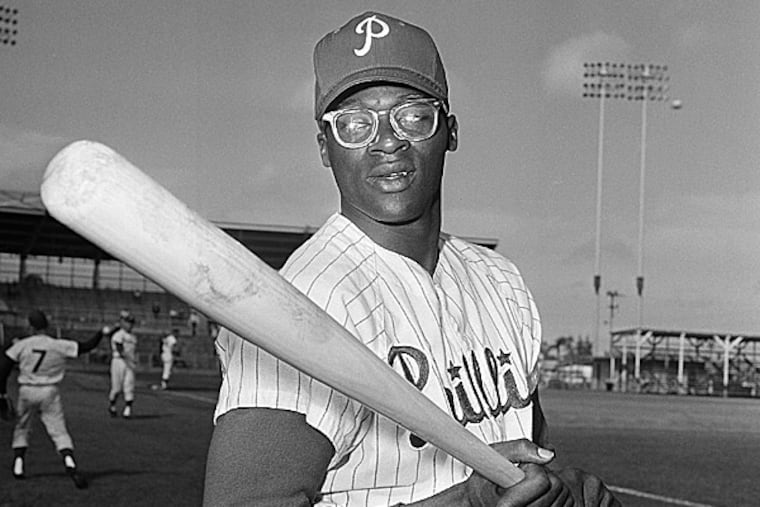Campaign for Allen strikes out
Despite massive effort, former Phillie Dick Allen fails to gain entrance to Baseball Hall of Fame by one vote.

MUHAMMAD ALI stood on that street corner in Miami Beach the day after he beat up Sonny Liston to win the world's heavyweight championship, surrounded by cynical sportswriters, and said, "I don't have to be what you want me to be," the best, truest thing Ali ever said.
Dick Allen was already walking that walk, talking that talk. Well, maybe he didn't talk that talk, because he kept his feelings deep inside that Mosler Safe of a chest that sat atop that narrow waist, bookended by those steel-cable arms that enabled him to hit 20 homers that traveled more than 500 feet.
That statistic came courtesy of Bill Jenkinson, who has devoted much of his adult life to researching memorable home runs, wind, weather, where they landed. Jenkinson joined forces with Mark Carfagno, the emotional former groundskeeper; with Mike Tollin, the pragmatic movie producer; with Dick Rosen, a Society for American Baseball Research guy who knew Allen growing up in Wampum; with a public relations wizard named Joe Ferry; with a weather-beaten sportswriter, and a diverse assortment of others who campaigned to get Dick Allen into baseball's Hall of Fame.
Allen wanted no part of the campaign. Which explains the mantra, "He won't complain, so we must explain." Awkward. Maybe that's what hurt us? Maybe we'd have gotten one more vote if we'd used, "He won't squawk so we must talk!" or "He won't gripe, so we must type!" Maybe two exclamation points!! Or three!!!
We failed. By one vote. One stinking vote. Allen needed 12 votes from that committee of 16 that met in San Diego. He got 11.
"I'm crushed," said Tollin. "I feel like crying."
There's no crying in baseball, or in Hall of Fame voting. We did almost everything right. We researched the numbers, OPS-plus and WAR and JAWS and black type and 50 shades of gray type and the numbers were dazzling.
From 1964 to 1974, Allen hit .299, with a .386 on-base percentage with a .554 slugging average. He was right up there with Willie Mays and Henry Aaron and guys who were first ballot Hall of Famers.
We provided comparisons with other Hall of Famers, with guys who had to wait forever and a day to be inducted, like Jim Rice, who finally got in after a "feared hitter" campaign. Well, Dick Allen was in the top 10 in intentional walks in seven different seasons.
We were willing to cite the nightmare of 1964. In those last 12 games, with others gagging, Allen hit .429 with five doubles, two triples and three homers and was voted Rookie of the Year. Analytical guys came out of nowhere to help, armed with ISO numbers. ISO stands for Isolated Power, the stat that determines how many of a player's hits are going for extra bases. Allen's ISO ranked fourth behind Willie McCovey, Aaron and Willie Stargell.
More analytical guys joined in, comparing Allen's numbers with the other players on the Golden Era ballot and he won those comparisons from here to Little Rock. We were so far up the high road we were gasping for air. We did not furnish photos of Allen wearing his batting helmet in the field, at home, after that scuffle with Frank Thomas. No close-ups of the smudges or the dents from batteries and assorted missiles. No raucous sound track of the jeers. At home!!!
And then, in the final week, the heavyweights climbed aboard, talking softly but sternly about racism, about the sociology of the mid-1960s, about an unwillingness to turn the other cheek the way that Jackie Robinson did a decade earlier. Howard Bryant in ESPN The Magazine. Bob Nightengale in USA Today. And then, Bill Rhoden in the Sunday New York Times.
Maybe one too many, because Allen came out of the shadows he'd chosen, to say, "I could have handled things a little better. But I wouldn't have changed a thing. I said what I said, did what I did, meant what I meant . . . and I'll stand behind every bit of it."
And he will stand outside of Cooperstown for now, his own man, content in his own skin, the greatest player in baseball history NOT in the Hall of Fame.